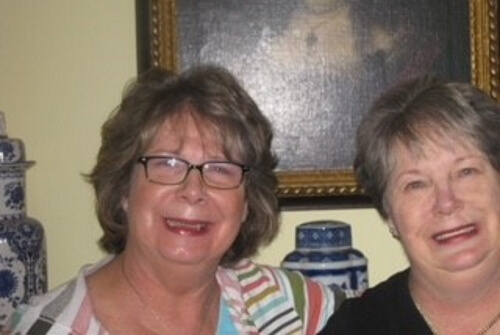At Carolyn Kershaw and Darlene Musso’s first visit to Dana-Farber in July, Irene Ghobrial, MD, greeted them with some unexpected news.
“We walked in and she said, ‘Did you know you two are famous in our lab?’” Kershaw recounts.
Their local renown stems from their participation in the PROMISE study at Dana-Farber’s Center for the Prevention of Progression (CPOP), which Ghobrial directs. The study is collecting blood samples from people at high risk of developing conditions that can precede the blood cancer multiple myeloma. It is open to African Americans and those with a parent, sibling, or child diagnosed with myeloma, one of its precursor conditions, or another blood cancer. The goal is to devise screening methods for at-risk individuals and learn why some patients go on to develop myeloma and some don’t.
Kershaw and Musso are unique among the study’s participants because, although myeloma isn’t known to be an inherited disease, they are identical twins.
Their decision to join the study arose from a desire to assert control in the face of an unsettling diagnosis.
“It’s an awful feeling to think that a disease is coming after you and you don’t know what’s going to happen,” says Musso, who lives in Georgia. “This was a way to take the reins, to do what I could. There was also the idea that this could help someone in the future, even if it’s not me. Both Carolyn and I have grandchildren.”
“Someone else’s grandchildren, if not ours, could benefit,” Kershaw added, finishing her twin’s thought.

Path to PROMISE
The sisters’ path to PROMISE began in 2016 when Musso was diagnosed with smoldering multiple myeloma (SMM), a condition marked by abnormal proteins known as monoclonal, or M, proteins in the blood. SMM does not produce symptoms, but about half of those diagnosed with it develop myeloma within five years.
“My oncologist told me my case looked very bad,” Musso recalls. “I cried when she told me I had months, not years, left.”
In the despondency that followed her diagnosis, Musso learned about the PCROWD study, also run by the CPOP. The study collects tissue samples from patients diagnosed with precursor conditions of blood cancers to uncover the molecular changes that occur as they evolve — and ultimately to develop drugs targeting the earliest changes.
“Becoming part of the study gave me an opportunity to be proactive,” Musso relates. From PCROWD, she learned about PROMISE and asked her two sisters and two grown children to consider joining. All were receptive, all had their blood tested, and all tested negative for precursor conditions.
Musso herself received some more encouraging news. She had joined a support group whose leader suggested she go to a specialist in multiple myeloma for a second opinion.
“He was much more encouraging,” Musso says. “He said that even though there were some genetic abnormalities in my plasma cells [which make the M protein], there were others that kind of ameliorated them. Instead of being at high risk of developing myeloma, I was at medium risk.”
The improvement in her prospects were offset by a change in her twin’s. Two months after her initial blood test, Kershaw, who lives in Maine, learned from the CPOP lab that a new, more sensitive test of her blood showed a spike in the M protein, indicating a condition known as monoclonal gammopathy of undetermined significance (MGUS), which, like SMM, produces no symptoms but can be a precursor to myeloma.
Along with the psychological lift of participating in the PROMISE study, the twins say they’ve been buoyed by the profusion of new treatments for myeloma.
“It’s really made me a believer,” Musso says. “I’m blown away by the number of new drugs that have been approved in the last few years. There’s no cure yet, but patients are living longer and being more productive.”
“The more you know, the more you’re capable of handling the situation with a degree of intelligence instead of panic,” Kershaw says.
“The PROMISE and PCROWD studies are truly direct-to-patient community studies that enable and empower participants to screen for myeloma and also identify risk of progression,” says Ghobrial. “I really believe that the next frontier of cancer discovery is about early detection and interception before disease progression.”
